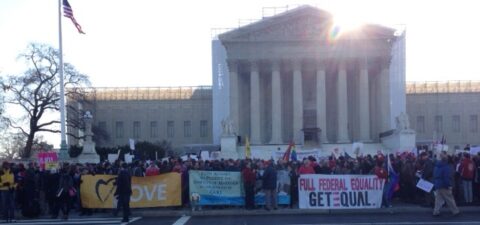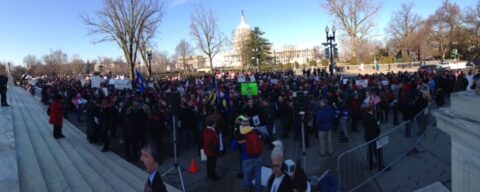Federal Courts/Jurisdiction

Top Five Immigration Stories from 2013
From the beginning, it was clear that 2013 was going to be a big year for immigration. The results of the 2012 Presidential Election were widely interpreted as a rebuke to Mitt Romney’s enforcement-only “self-deportation” policy, and President Obama’s huge victory among minority communities was seen as a… Read More

Supreme Court Considers Restrictive Interpretation of Child Status Protection Act
Yesterday, the Supreme Court heard oral arguments in Mayorkas v. Cuellar de Osorio, a case challenging the government’s restrictive interpretation of the Child Status Protection Act (CSPA). The CSPA provides relief for the longstanding problem of children included on a parent’s visa application who “age out” –… Read More

Supreme Court to Interpret Child Status Protection Act
Last week, several groups, including the American Immigration Council, submitted an amicus brief to the Supreme Court describing the heartrending stories of young people who have been separated from their families due to government processing delays and the shortage of visas. The case, Mayorkas v. Cuellar de Osorio, concerns the Child Status Protection Act (CSPA), which provides relief for the longstanding problem of children included on a parent’s visa application who “age out” – that is, turn 21 and lose their status as a “child”– before a visa becomes available. Upon turning 21, these young adults are unable to immigrate with their parents and must begin the visa application process anew, starting at the back of a new visa line. They end up being separated from family for years, even decades. The stories in the amicus brief make the case for how important it is that the law provide a remedy broadly available to young adults who age-out. Read More

Alabama’s HB 56 Anti-Immigrant Law Takes Final Gasps
Immigration advocates who have been fighting against Alabama’s HB 56, the punitive immigration measure often called the “show me your papers” law, declared victory after the state agreed not to pursue key provisions of the 2011 legislation. The agreement is part of a settlement of long-running lawsuits filed by the U.S. Department of Justice (DOJ) and a coalition of civil rights groups against HB 56. Alabama. The Supreme Court earlier this year refused to hear the state’s appeal of a previous federal court’s ruling that gutted the law. Read More

Former Attorney General Gets it Wrong on DOMA and Same Sex Immigration Benefits
Former Attorney General Alberto R. Gonzales is advocating in the New York Times that the Supreme Court decision in U.S. v. Windsor, which invalidated Section 3 of the Defense of Marriage Act (DOMA), should not allow the Obama administration to afford immigration benefits to married, same-sex bi-national couples. Rather, he argues, the administration is bound by a disturbing, 30-year-old Ninth Circuit case, Adams v. Howerton, which rested on discriminatory and outdated law and facts. Essentially, Mr. Gonzales is urging that the administration ignore 30 years of social progress and legal developments and return to a 20th century mentality and jurisprudence. He is mistaken. Read More

Supreme Court’s DOMA Decision Good for Economic Competitiveness
In the global economy of the twenty-first century, a globally mobile workforce is critical to remaining competitive. Yet for LGBT employees, their families, and their employers, significant barriers remain in place. The Supreme Court’s June 26 decision in United States v. Windsor finding part of the Defense of Marriage Act (DOMA) unconstitutional has clear and direct benefits for married same-sex couples, including bi-national couples. But beyond the benefits to married couples themselves, the Court’s decision is also a win for economic competitiveness. Specifically, the DOMA ruling makes U.S. businesses more globally competitive because they now can attract and retain foreign-born employees who want to stay in the United States with their same-sex spouses. Read More

Supreme Court Strikes Down DOMA, Affirms Immigration Rights of Gay and Lesbian Couples
Today, the Supreme Court issued its decision in the case United States v. Windsor, striking down section 3 of the Defense of Marriage Act, or DOMA, on the basis that it violated equal protection under the due process clause of the 5th Amendment. DOMA established an exclusively heterosexual definition of “marriage,” and denied same-sex couples any federal benefits, including immigration benefits. This is a historic day for gay and lesbian marriage rights, as DOMA disqualified same-sex couples from over a thousand federal benefits, and made same-sex couples in committed relationships second-class citizens in the eyes of the federal government. Read More

House Immigration Bill Promotes Old Model Immigration Solutions
Today the House held a hearing on H.R. 2278, the "Strengthen and Fortify Enforcement Act" (the SAFE Act), which is designed, as its name suggests, to be a lopsided, enforcement-only bill that imposes additional criminal penalties, border security, and detention and deportation, while encouraging discredited policies such as self-deportation and state interference with immigration law. Instead of these old enforcement-only policies, which do not work, what is needed is a comprehensive solution that fixes our broken legal immigration system and provides a path to earned legalization. Read More

Immigration Reform is an LGBT Issue
By Victoria Neilson, Legal Director, Immigration Equality. This week the U.S. Supreme Court is hearing oral arguments in two cases, Hollingsworth v. Perry and United States v. Windsor, that will forever change the course of the struggle for lesbian, gay, bisexual, and transgender (LGBT) equality. While we are hopeful that the Court will strike down the Defense of Marriage Act (DOMA) thereby clearing the way for the federal government, including U.S. Citizenship and Immigration Services and the Department of State, to honor our marriages, no one can predict with any certainty what the Court will do. Read More

How the Supreme Court Decision on DOMA Will Impact Immigration Law
Family unity is one of the driving forces in our immigration system. United States citizens and lawful permanent residents can obtain immigrant visas for their spouses. Many foreign nationals who come to the United States on employment-based visas bring their spouses and children with them. And some waivers and forms of relief from removal are available only to those with close relatives living in the United States. Read More
Make a contribution
Make a direct impact on the lives of immigrants.
